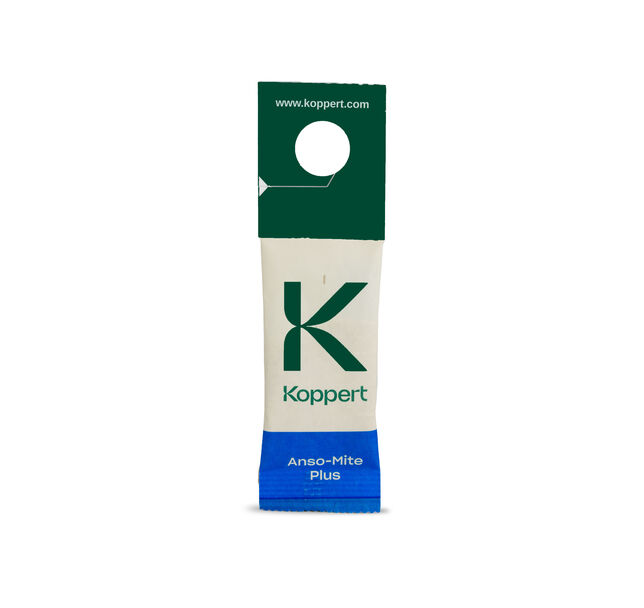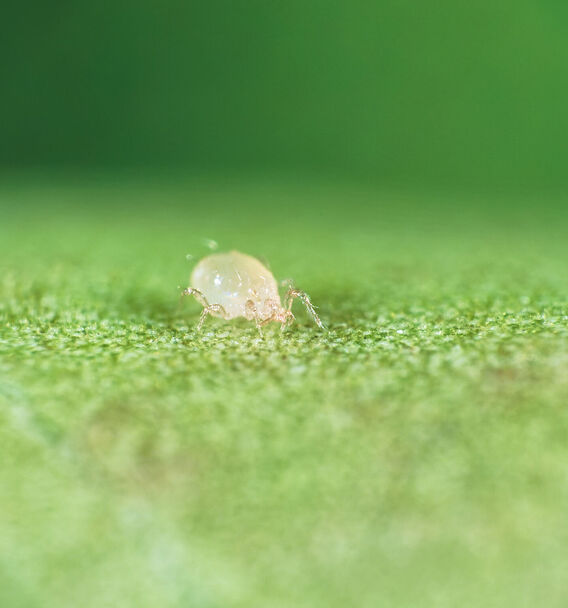Use for
Pests
Young larvae of various thrips species. Also has an effect on eggs and larvae of whitefly, all stages of non-webbing spider mites (e.g. European red mite, Panonychus ulmi) and rust mites.
Crops
Do not use in tomato.
How it works
Mode of action
Predatory mites multiply in the sachet and disperse into the crop over a period of several weeks. They pierce the prey with their sucking mouthparts and suck out the contents.
Appearance
Mobile stages are beige, droplet-shaped mites. Eggs are oblong and transparent white. Adults are about 0.5 mm in size. Predatory mites are usually found on the lower surface of the leaves, often in the corner of the main vein and lateral veins. It is not possible to distinguish Amblyseius andersoni in the field from Amblyseius swirskii, Neoseiulus californicus, Neoseiulus cucumeris, Transeius montdorensis or Amblydromalus limonicus.
Product specifications
| Pack size | 500 sachets. Each sachet contains 125 predatory mites and prey mites. |
| Presentation | Sachets in cardboard box. |
| Carrier | Bran. |
Directions for use
Application
Hang sachets in sheltered locations in the crop, not exposed to direct sunlight. Sachets already have an exit hole. Hold sachets by the cardboard strip at the top, to avoid damaging the predatory mites.
Dosage
The dosage of Anso-Mite Plus depends on climate, crop and pest density and should always be adjusted to the particular situation. Start introduction preventively or as soon as the first pests are detected in the crop. Use at least 4,000 sachets per ha and hang them evenly spaced in the crop. Release should be repeated after 4 weeks if the pest is not controlled. Consult a Koppert advisor or a recognized distributor of Koppert products for advice on the best strategy for your situation.
Environmental conditions
Amblyseius andersoni is effective at temperatures above 14°C/57°F. Optimum temperatures are between 20 and 28°C (68 and 82°F). A. andersoni is sensitive to relative humidity below 65%.
Combined use
Can be combined with Orius spp.. Do not combine with other generalist predatory mites (Amblyseius swirskii, Amblydromalus limonicus, Transeius montdorensis and Neoseiulus cucumeris).
Precautions
Application of this product can cause sensitization or allergic reactions, we therefore advise to take the necessary precautions.
Side effects
Pesticides can have (in)direct effects on biological solutions. Find out which pesticides have side effects on this product.
Product handling
Storage time after receipt
1-2 days.
Storage temperature
10-15°C/50-60°F.
Storage conditions
In the dark, provide ventilation to prevent CO₂ accumulation.
"The general conditions of Koppert (Koppert B.V. and/or of its affiliated companies) apply. Only use products that are permitted in your country/state and crop. Always comply with the conditions specified in local product registrations. Koppert cannot be held liable for unauthorized use. Koppert is not liable for any loss of quality if the product is stored for longer than recommended and/or under incorrect conditions."

